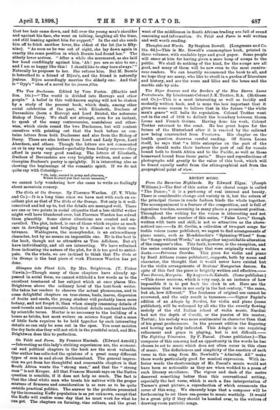RECENT MUSIC.
From the Bavarian Highlands. By Edward Elgar. -(Joseph Williams.)—The first of this series of six choral songs is called "The Dance ; " it is a part-song of real interest and beauty. There is considerable change and variety in it, but the return of the principal theme in rondo fashion binds the whole together. The accompaniment is a feature of the composition, and is fall of ingenious touches, assuming in many places a prominent position. Throughout the writing for the voices is interesting and not difficult. Another number of this series, "False Love," though written with taste arid skill, is not so attractive as the above- noticed one.—In St. Cecilia, a collection of two-part songs for treble voices (same publisher), we regret to find arrangements of piano music, such as Mendelssohn's " Spinning-Wheel " from the "Songs without Words," an altogether unjustifiable alteration of the composer's idea. This fault, however, is the exception, and the series contains many things that were originally written as duets.—Petrovna Czardas. This piece for violin and piano by Basil Althaus (same publisher), suggests, both by name and character, the thought that it would never have existed but for the violin arrangements of Brahms' Hungarian dances. in spite of this fact the piece is brightly written and effective.— Votes Dansez, Marquise. By Augusta de Kabath. (Same publisher.) —This danse ancienne, which is very easy, is an instance of how impossible it is to put back the clock in art. Here are the harmonies that were in use early in the last century, "the same, but ah, how different." The freshness of original use cannot be recovered, and the only result is tameness.—Signor Papini's edition of an Adagio by Nardini, for violin and piano (same publisher), will be welcomed by all who like the sweetly flowing melody of the old Italian school of violin music. Nardini had not the depth of Corelli, or the passion of his master, Tartini ; his melody was more sentimental in character than that of his great predecessors. In the present edition the fingering and bowing are fully indicated. This Adagio is one requiring refinement and grace in playing, but is not difficult.— The Fighting Temeraire. By F. Pascal. (Same publisher.)—The 'composer of this sea-song had an opportunity in the words he has chosen to set to music which does not often occur in this class of music. The definiteness and simplicity of the emotion of each verse in this song from Mr. Newbolt's "Admirals All" make these words particularly good for musical expression. With in- ferior words the shortcomings of Mr. Pascal's music would not have been so noticeable as they are when wedded to a poem of such literary excellence. The vigour and dash of the metre deserved something better than this conventional setting, especially the last verse, which is such a fine interpretation of Turner's great picture, a reproduction of which ornaments the cover of this song. We sincerely hope that a composer will be forthcoming to set these sea-poems to music worthily. It would be a great pity if they should be handed over, to the writers of drawing-room patriotic songs.


































 Previous page
Previous page